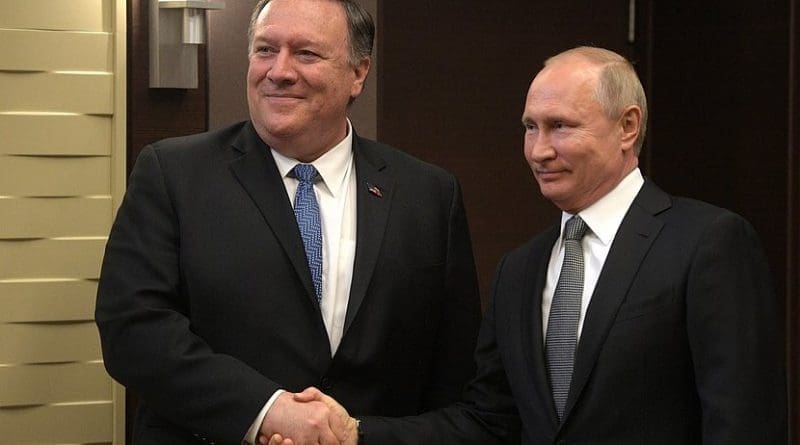Trump’s Desire For Improved US-Russia Ties Frustrated – OpEd
By Arab News
By Andrew Hammond*
Russian President Vladimir Putin and Foreign Minister Sergey Lavrov had warm words for Mike Pompeo on Tuesday in his first trip to Russia as US secretary of state. However, despite Putin’s call to “fully restore” ties — in the highest-level US-Russia meetings since Putin met Donald Trump last year — bilateral relations remain largely frozen.
The reason why US-Russia relations matter is, in part, the growing importance of Moscow as an international actor under Putin. Some two decades after first assuming power, the Russian president has partially restored his nation’s geopolitical prominence, including through gambits such as the annexation of Crimea and the Syria intervention, which have both caused tensions with the Trump team. Yet this has — so far — played well domestically for Putin, helping him win a new six-year term of office last year.
On the agenda on Tuesday, in what was the first big meeting between Moscow and Washington since the Mueller report was released in the US, were a plethora of issues. They included Venezuela, Ukraine, Syria, North Korea, Afghanistan, Iran, counterterrorism, and arms control agreements, including the 1987 Intermediate-Range Nuclear Forces Treaty, which the Trump team has said it is withdrawing from in response to alleged Russian violations.
While both sides spoke about commitments to enhance ties, there were no apparent breakthroughs on any of these issues, although Pompeo indicated that counterterrorism and combating nuclear non-proliferation are areas where, going forward, more common ground can be found. Yet, amidst disagreements in many other areas, the strategic intent of Trump and Putin to uptick ties based, in part, upon what appears to be mutual self-regard looks likely to be frustrated — for now at least.
For his part, the US president has given multiple indications, including in Helsinki last year when he met Putin, that he believes Russia is not a serious threat to the US and that a new era in bilateral ties is needed. He has hinted that he might drop economic sanctions if the country “is helpful,” and appears to believe there are multiple common interests over issues such as preventing Iran from securing nuclear weapons and potentially even helping contain China in a new global balance of power.
Yet Pompeo (like his predecessor Rex Tillerson) is more skeptical, and Trump and Putin’s proposed repositioning of relations looks, at the very least, to be on ice and potentially unrealizable in the short to medium term. This is, in part, because bilateral foreign relations have become frostier since 2017.
In addition, the Trump team remains under significant domestic US political pressure over its relationship with Russia. For, while the Mueller report cleared the president of “collusion” with the Kremlin, it made crystal clear that Moscow made significant and sustained efforts to influence the outcome of the 2016 US presidential election against Democratic nominee Hillary Clinton, and that this threat to US interests is ongoing.
To this end, just prior to Pompeo’s trip, Senate Democratic leader Chuck Schumer submitted a hard-hitting letter to the secretary of state. This urged that he tell Putin and Lavrov that any attempts to interfere with the 2020 presidential and congressional elections will be met with “an immediate and robust approach.”
But it was not just political leaders in the US and Russia who watched Pompeo’s meetings closely, but also those in Europe. Trump is being keenly watched across the continent for how any shift in ties with Moscow may impact NATO, having previously described the military alliance as “obsolete,” sending chills down the spines of states in Eastern Europe.
Already, uncertainty over Trump’s NATO policy is spurring EU nations to seek to reverse around a decade of defense spending cuts, totaling around 10 percent in real terms. Moreover, a new European Defence Action Plan is being moved forward that will see greater continental military cooperation.
With Chinese Foreign Minister Wang Yi having been in Sochi on Monday to meet Lavrov, the Pompeo meetings were also closely watched in Beijing, which has enjoyed a warming relationship with Moscow under the presidencies of Putin and Xi Jinping. Indeed, the Chinese premier asserted last year that bilateral relations were “the highest-level, most profound and strategically most significant relationship between major countries in the world.” He also praised Putin by stating that he “is my best, most intimate friend.” The Russian president appears to share this sentiment, underlining how misguided Trump may be if he believes Moscow might ally with Washington against Beijing any time soon.
Perhaps the most cited area of warmer Russia-China ties is on the political and security front. However, they also enjoy an extensive economic dialogue, which has warmed since Moscow’s annexation of Crimea.
Russia has, for instance, announced plans for numerous cooperation projects with China, including a new method of inter-bank transfers and a joint credit agency that seeks to create a shared financial and economic infrastructure that will allow them to function independently of Western-dominated financial institutions. Both are also among the states involved in creating alternative forums to the World Bank and International Monetary Fund, including the New Development Bank.
While Pompeo’s meetings had warm words, US-Russia rapprochement remains on ice. Key challenges remain the domestic political pressure on Trump regarding his policy toward Moscow, and also the broad array of key foreign issues, from Venezuela to nuclear arms control, where the two sides are in significant disagreement. While Trump and Putin both appear to want much warmer ties, this may therefore prove unobtainable, not least given the growing closeness of Moscow’s relationship with Beijing under Xi.
- Andrew Hammond is an Associate at LSE IDEAS at the London School of Economics

